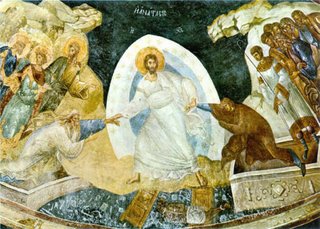 Monastery of Chora,
Monastery of Chora,
ConstantinopleAnthony McRoy asks:
Was Easter Borrowed from a Pagan Holiday? That's what the Venerable Bede thought, but McRoy adduces evidence to the contrary.
This provides a good occasion for me to republish something I wrote nearly two decades ago and published here for the first time three years ago, titled,
Easter: What's in a Name?In most western languages the word for the day which we English-speakers know as Easter derives from the Hebrew
pesach, or passover, usually by way of its Aramaic equivalent,
pascha. Only in German (which calls it
Ostern) and English is the Paschal feast called by a name sounding more like a direction on a compass than a christian holiday. Where does our word Easter come from?
When I first planned to write on this subject, I intended to argue that we Anglo-Saxons should adopt "Pascha" in place of "Easter." I still think it would not be a bad idea. In fact in some nonstandard English dialects it is already known as
Pace or
Pasch, and in Old Scots (the language of Robert Burns and
Auld Lang Syne) as
Pasche or
Pash.
At first glance the origin of "Easter" looks suspect. There is a long tradition, going back to the early English church historian,
the Venerable Bede (673-735), that "Easter" derives from Eastre, pagan goddess of spring and of the dawn. Although most Christians are probably aware that many of the days and seasons of the church calendar were taken over and adapted by the early Christians from their pagan neighbours, many will find it offensive to think that the day itself could still bear the name of a false deity. English-speaking Christians might well look with some envy on their fellow believers whose languages give the day of Christ's victory over death a name with more obviously biblical and christian roots.
For example, in most of the Romance and Germanic languages, as well as in Greek, the name for this day is some variation of
pascha. Many of the Slavic and Baltic languages appropriately call it the Great Day or Great Night. And some of the Finno-Ugric languages (for example, Estonian and Hungarian) call it the Feast of Meat, a reference to the end of the long Lenten fast. (Perhaps it also refers to the tradition that at least on Easter all Christians were expected to receive the elements of the Lord's Supper — that is, the body and blood of Christ — even if they had abstained during the rest of the year.)
In English we are stuck with the apparently tainted "Easter." But twentieth-century scholarship has called into question Bede's interpretation. There is still no general agreement on the origin of the word, but it has been suggested that it may come, not from the name of a goddess, but from
eostarun, the Old High German word for the dawn itself. (Our word "east" obviously has similar origins.) In fact there are some remarkable similarities between the words for "resurrection", "Easter" and "dawn" in several Indo-European languages. The common meaning underlying these words is a "rising" of some sort.
If our own word Easter originally meant sunrise, then perhaps it was fittingly applied to the Rising of the Son of God from the dead by our Teutonic forebears. And if this is so, then it seems that we English-speakers do after all have a most appropriate name for the feast of Christ's Resurrection.
